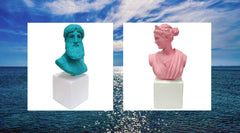A 2500 year old Pandemic and the goddess of hygiene "Hygeia"
2020 - The pandemic Covid-19 strikes
„High fever, severe cough, starting from the head and throat, affecting breathing and then the whole body, especially the intestines...“.
This is not a description of a Corona patient today, but a detailed record of the symptoms during the "Plague of Athens", the pandemic in ancient Greece in the 5th century BC, written down by the "father of European historiography" Thucydides (around 450 - 400 BC, “History of the Peloponnesian War”, book II, 47–54).
Pathogens that cause an infection were unknown, the disease was seen mostly as punishment from the gods.
The historian observed that those who had survived the plague did not fall ill again. First indication of immunity, over two millennia ago!
He also described how animals fell ill and died, and discussed whether they were infected by humans.
The plague came from Ethiopia via Egypt and Libya, to Athens via the port of Piraeus.
Another important observation is that a particularly large number of “doctors” and “nurses” got infected.
All of this seems familiar to us. „The pandemic lasted about two years, then came to a standstill before a new outbreak occurred after 1.5 years."
Social impact of the pandemic in ancient Athens
Not only did no treatment help, all means to which one fled otherwise failed, including prayers and oracles.
"Some died as a result of inadequate care, others despite sacrificing care", writes Thucydides.
The entire social network was destroyed and everything that had been valid until then.
"They avoided visiting each other out of fear".
When the number of victims grew out of proportion, every human order collapsed and crime increased because nobody feared being prosecuted anymore.
There are also archaeological findings about these times: at the old Kerameikos cemetery in Athens a mass grave was detected with 240 people – victims of the Attic plague.
What pandemic was the plague of Athens?
To date, experts on History of Medicine have been discussing probabilities from Typhus to Ebola.
It was not a "plague" in our sense, caused by the specific pathogen transmitted by rats.
In ancient times, however, the term was used in a different way:
Galen, from the Greek city of Pergamon, (119-216 B), later a doctor of the Roman emperors, defined it as follows: "Epidemic is a disease in which many fall ill in one place, plague one where the disease kills many of them".
Social distancing 2500 years ago was the way to confront the “plague”, the citizens self-isolated voluntarily out of fear. With all the consequences.
The ones that didn’t believe that the plague was gods will tried to find other causes and guilty parties:
They thought that Evil came from outside, after all it was the period of Peloponnesian war.
Did the enemy poison the drinking water? The Athenians discussed this but Thucydides did not adopt such conspiracy theories.
If gods sent the disease only gods can help!
According to the myth, Athens protector, great goddess Athena helped the city and was given the supplementary name “Hygeia” and was since called Athena-Hygeia.
It was not before 2nd century BC that Pausanias described an independent goddess Hygeia:
A second statue at the entrance to the acropolis next to Athena, which means that the issues of health had become critical for the Athenians who decided to worship a “specialized” Goddess of health.

Hygeia (or Hygieia) the Goddess of health
The daughter of Asklepius, the "incomparable doctor" (Homer) and God of healing, had appeared as the new goddess; she was now self-employed and had her own temples in Epidaurus, Corinth and Kos.
However, she was no longer responsible for health as a whole like her father: the five daughters of Asklepius each had their own specialization!
Hygeia prevention, one sister healing, another medication, the third one aftercare and finally the fourth cosmetics and beauty – the full spectrum of today's health care.
Prophylaxis and rehabilitation, achieving and maintaining health for body and soul, an overall concept over 2000 years ago!
According to the myth Hygeia (or sometimes spelled Hygieia), used baths and healing springs, touch and massage; she promoted healthy eating and focused on everything that was conducive to positive attitude; she had observed that only self-positive thinkers had a good course.
(You can see how Hygeias head was depicted in this Hygeia head, based on a sculpture by Scopas from the temple of Athena Alea at Tegea as can be seen in National Archaeological Museum of Athens here)
Seems to be an old and proven method.
And what‘s really new today?
As it seems not so much for primary prophylaxis.
Today, preventive medicine says nothing else: observe hygiene, strengthen immune system through nutrition and physical fitness, but above all achieve your own positive attitude to life.
Medical science took giant leaps in every aspect: There is already an enormous amount of scientific knowledge about the importance of a healthy lifestyle, viruses and their genetics, ways of infection as well as about possible immunization and treatment.
And this knowledge increases every day, always starting from the basic principles of Hygeias ancient wisdom.
P.S.Where does the word Hygiene come from?
The word "Hygiene" comes from Greek "ὑγιεινή" (Hygieini), which comes from Hygeia (Hygieia - Ὑγίεια). The Hygieia symbol is the Bowl of Hygieia and it is the symbol of pharmacy, one of the most ancient and important symbols related to medicine in western countries. RELEVANT:
- Find a unique handmade Hygeia head here
- Since you are here, check our blog post about Hygiene today in: Soap for hand washing, personal care and hygiene
- Read this interesting article about the Athenian plague and its political consequences
Sources
- Thucydides: Peloponnesian War book II
- Wilhelm Ebstein: The plague of Thucydides. A historical-medical study, 1899
- Hildegard Zobel: Hygieia. The goddess of health. Scientific Book Society, Darmstadt 1990, ISBN 3-534-10919-8
- Goddess Hygeia

This work is licensed under a Creative Commons Attribution 4.0 International License.
This license lets others distribute, remix, adapt, and build upon this work, even commercially, as long as they credit KUKUVAYA for the original creation.




















